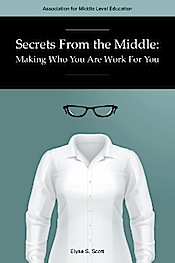How to Be a Successful Middle School Teacher
 By Elyse S. Scott
By Elyse S. Scott
“What the teacher is, is more important than what he teaches.”– Karl A. Menninger
My guiding principle as a middle school English teacher, even in the earliest days of my career, was that I was a human being first, a teacher second. I could never “turn off” who I was; what my students got each day was the essence of who I am. No facades, the real person, my authentic self.
On the face of it, that may seem simplistic, but it’s not really. We educators often feel that because students enter the physical plant known as “school,” the parameters and qualities of our relationships are already established. Perhaps there is a certain truth to that in the early grades, when children are enamored of their teachers and their school experience, but anyone who works with adolescents knows that developing a meaningful relationship is always a work in progress.
I am often amazed that many of us feel entitled to certain “givens” in our personal and out-of-school relationships but do not realize that those same “givens” should be at the very foundation of all we do with our students.
Whether we deal with family members or friends, the clerk at the grocery store or the head of the complaint department at the auto shop, we expect understanding, trust, diplomacy, and a sense of fair play. We want our concerns validated and taken seriously, and we want our voices to be heard. Our students are entitled to the same.
All the coolest curriculum materials and teaching strategies will not amount to much if middle grades teachers cannot reach their students. The way to do that is to embrace the following essential elements and make them integral to teaching practice.
Trust

Adolescents by their very nature are skeptical and loathe phoniness in others. So from Day 1 of the school year, they have to see that their teacher is someone they can count on to keep promises, listen with full attention, be accountable at all times, and not only be on top of our game about our subject matter but able to impart insights and wisdom about life.
Over my long teaching career, I learned that I had to share my authentic self, and that included tender parts of myself that might aid them in their middle school journey. I had grown up in a very dysfunctional environment, and I shared that with my students, especially those children who had similar backgrounds.
Not everyone can capitalize on adversity in their backgrounds to reach students, but all teachers should reflect on their personal priorities for teaching. What brings you to stand before these children? What do you think they should know about you before you begin the academic journey? What can you do to get them to trust you as a human being first?
Validation
Human beings need to know they matter. That was “the truth” that permeated all of my interactions with my students. Never in my career did I try to be popular, but I distilled my classroom practice into what I believe is the common denominator for all human beings: the need to be validated. That was my goal each year with every new batch of students: to find ways to validate each one, celebrating their gifts, redeeming even the most abrasive and irksome among them.
This “golden rule” opened pathways to and communication with even the most reluctant learners and students who were known for behavior problems. I also validated my students by truly listening to them and finding avenues for them to be heard. My classroom was a community of learners, and each member had a contributing voice.
Diplomacy

I always tried to be cool, calm and calculated in my dealings with my students. I was always very firm in establishing guidelines and expectations, as well as clarifying my role, but humor, creativity, and compassion were ever present to soften the edges.
Diplomacy and tact are always the answer. No amount of yelling, talking over students, embarrassing a student in front of others, or punishing the whole class for the sins of one or a few ever works for the long term. All educators must self-assess for all the behaviors they find abhorrent in their students. In essence, do we break our own rules?
My retirement from teaching has allowed me a certain detached perspective and the time to zero in on what contributes most to a classroom educator’s success – both in teaching and learning from adolescents. It all comes down to YOU. We go into teaching so idealistic. Then we listen to the venting and complaints in the faculty room about parents and principals and central administration and State mandates, about students who are apathetic and unaccountable, and about societal ills in general. We think we can do something to control it all.
But the secret to effective middle school teaching – any teaching really – is that we have no control over those factors. The wisdom I share with new teachers or teachers in the field who are self-reflecting is this: You can only control YOU and how you react to all those factors. You can only be in charge of your sense of ethics, your sense of fair play, and your skills of tact and diplomacy. You have to “make who you are work for you.”

Elyse is also the author of Awaken the Middle School Voice: Engineering the Language Arts to Excite Adolescents (AMLE, 2015). Read her other MiddleWeb articles here.






























brilliantly written with tons of care and heart !
kindest regards,
lynne hightower
You are right on all your points, but learning that you can only control what you do usually takes a long time of experience battling and fighting institutions that you can not change. For example, trying to change administrative leadership and discipline in a building. I have finally learned to let it go as much as possible and concentrate on my classroom and students. It makes my career so much more rewarding.
Your advice about teachers only being able to control themselves is on the money! My textbook said exactly what you said! (I’m pursuing my Bachelor’s Degree in Middle Math Education) Many of your other points about trust are also in my text. Your advice validated the importance of these specific traits for a successful middle school teacher.